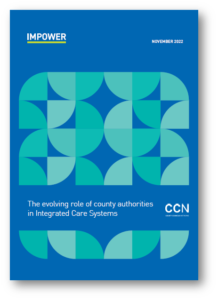
CCN Latest News, CCN News 2022 | 21 November 2022

IMPOWER’s new report, The Evolving Role of County Authorities in ICSs analyses the new systems which replaced Clinical Commissioning Groups this year from the perspective of councils. The study, commissioned by the County Councils Network (CCN), is based on a detailed survey and interviews with local authorities in county areas and senior health officials.
 County leaders say councils and health partners are forging closer relationships in many ICSs across England, and evidence in the study shows that council leaders are investing significant amounts of time with health colleagues within these arrangements. While these signs are positive, there are significant challenges to overcome before councils can consider ICSs a truly “partnership” endeavour.
County leaders say councils and health partners are forging closer relationships in many ICSs across England, and evidence in the study shows that council leaders are investing significant amounts of time with health colleagues within these arrangements. While these signs are positive, there are significant challenges to overcome before councils can consider ICSs a truly “partnership” endeavour.
Download the report here.
The report finds that ICSs ‘do not yet feel like a paradigm shift towards delivering truly local priorities based on local engagement.’ Mandated, top-down targets from the NHS and central government are part of this, as well as a perception that too much of their focus, to date, is tending towards addressing pressures in the health system. If this continues, it may prevent local solutions which would shift the culture of ICSs to better encompass long-term preventative and community initiatives in addition to acute care.
Pressures across the NHS and councils this winter, especially discharge operation and funding, as well as budget-setting for next year are likely to be the early tests as to whether the emerging governance structures in ICSs will lead to the health and social care integration intended by the government and drive the step change needed in service delivery.
The report, released at CCN’s Annual Conference today, finds:
The report recommends that the government and health service review the level of centrally imposed targets on ICSs, particularly in shared policy areas with local government, which could help move towards a culture shift that gives greater prominence to prevention. ICSs themselves should ensure that funding and decision-making is devolved down to the most appropriate level in order to best facilitate local joint-working.
It also calls on council and local NHS leaders to agree on a small number of specific and achievable inclusive ambitions this winter to build partner confidence in ICSs’ ability to deliver real change.
 Cllr Tim Oliver, Chairman of the County Councils Network, said:
Cllr Tim Oliver, Chairman of the County Councils Network, said:
“Councils support the introduction of ICS and their aim to closer integrate health and care services and ultimately drive down costs for both the NHS and local government through preventative measures. Since their inception, evidence shows that councils have been enthusiastic about these arrangements and are spending more time with health colleagues.
“But today’s report acts as a useful barometer to find out what is happening on the ground in ICSs across England. Partly as a result of the funding challenges facing the NHS, and top-down central targets, there is a feeling from councils that there is too much focus on immediate and acute NHS pressures, such as hospital discharge and ambulance waiting times, rather than the preventative agenda.
“There is a risk that councils’ cautious optimism turns into disengagement, with some colleagues feeling locked out of the decision-making processes within ICS. If the focus on immediate NHS pressures continues, then there is a high chance councils will view ICSs as simply another NHS reorganisation to work around.
“It is imperative we learn the lessons of these first few months of working in ICSs’ and look to forge a culture where local decision making and preventative health and care is given equal footing to acute pressures. Today’s report sets out some key recommendations to move towards this.”
 Sean Hanson, Chief Executive of IMPOWER said:
Sean Hanson, Chief Executive of IMPOWER said:
“This report is the first to consider ICSs from the perspective of councils whose role is central to the integration agenda. These systems are complex and their implementation varies widely across councils but our report is clear that the desire exists across local authorities and the NHS to reduce health inequalities, boost preventative services and improve outcomes for citizens. However, there is concern that a lack of local autonomy and squeezed budgets will make it difficult to convert that desire into action.
“IMPOWER’s report sets out steps that all ICS partners can take to start the journey towards a modern system of care. Change will not happen overnight and systems need to focus at this early stage on specific and achievable goals that will drive focus, build trust and deliver real change.
“Systems face two major tests in the coming months – winter, which will bring with it a national focus on hospital discharge, and budget setting for the next financial year. How ICSs emerge from these two tests is likely to prove the bellwether for future joint working.”
Notes to editor
© 2024 County Councils Network | Credits | Site map | Cookies | Privacy Policy.